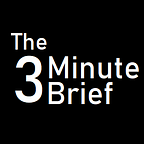The End of the Chinese Civil War
On the 21st of September 1949 the People’s Republic of China (China PRC) was officially declared as a state by Mao Zedong, the leader of the victorious communist revolutionaries.
The impact of this declaration upon the United States, the USSR and the wider world in the new cold war is discussed in today's 3 minute brief.
Brief History of the Civil War
Prior to and during the Second World War, China had been split into 3; communist controlled areas, nationalist controlled areas and areas occupied by the Japanese.
The two Chinese factions during the war worked together as the Chinese United Front to fight against the Japanese imperial occupation. At the end of the war this inevitably broke down and the power struggle for control of China began once again.
The civil war was split into two sides: the nationalists led by Chiang Kai-shek and the communists led by Mao Zedong.
Initially, the nationalists were winning the war particularly because they had the backing of the United States, United Kingdom and France whilst the Communists only had the support of the Soviet Union.
However, in 1947 the United States removed several thousand troops due to unpopularity of their policy to the Chinese. Popular general George S. Patton also withdrew himself from the war and with this the tide began to turn as the nationalists were increasingly being cut off from natural resources and supplies.
Finally in 1949 the communists successfully drove out the nationalists and forced them to abandon all ground on mainland China. The nationalists only held Taiwan. On the 21st of September 1949, 69 years to the day, Mao declared the birth of the People’s Republic of China. Officially, China PR would be established on the 1st of October 1949.
The Impact of the Chinese Communist victory in the United States
The communist victory in the Chinese civil war had a particularly significant impact in the United States.
As was previously noted, the roles both militarily and diplomatically of the United States and Soviet Union were critical to the outcome of the civil war. This was particularly because of the beginnings of the Cold War.
The first US theories of the Cold War portrayed the idea that the Soviet Union would constantly look to spread communism until it had achieved its global revolution and it was believed that the United States, after its last prewar isolationist period led to the spread of fascism, should directly attempt to stop it through the economic aid of the Marshall Plan and Truman Doctrine.
After the United Front dissolved and civil war restarted, China was believed to be the ideal state for the containment of communism. Essentially, this mean’t that if China were pro-US or pro-West and ideally a democracy this would stop the spread of Communism to its border states and contain how far the USSR could spread its ideology.
The US congress saw the ‘fall’ of China as a complete disaster and put immense pressure on the president Harry S. Truman to become tougher on communism. The whole democratic party was accused of being soft on communism as a result and it was a huge contributing factor in the electoral victory of President Eisenhower 3 years later.
It also created a large amount of domestic unrest within the United States, as a prominent senator Joseph McCarthy initiated a red scare which led to the trial and prosecution of many under charges of espionage. This happened both at government level but also at local levels as individual communities charged their own neighbours nationwide. The accuracy of some of these prosecutions is still debated.
Overall, the Chinese communist victory had far reaching impacts but was by far most damaging to the United States. This was a foreign policy defeat that cost the democratic party the next election and forced Truman to increase defence and military spending to an incredible rate to aid the border states of China to draw a new line upon which to achieve containment.
References and Links
http://acienciala.faculty.ku.edu/communistnationssince1917/ch9.html
Contact us: @ 3Brief on twitter or via email at threeminreview@outlook.com
